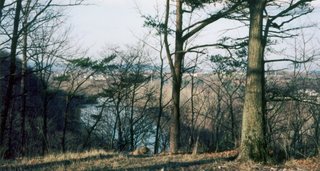map loading...
The best and the worst thing about archaeology sites is location. Knowing the location of a site or multiple sites can help create models to find more sites and/or better understand what we know about a site. At the same time, archaeological site location is highly secure data. This is for the sites protection. There is a lot of money to be made on archaeological artifacts.
Here is the location of my favorite archaeological site. I may be breaking a rule by showing this, but it doesn't really matter. Since, Google Maps is living in the past, you wouldn't know that this site is now covered in dozens of high density housing units. Any potential scavengers would find nothing here except golf balls the folks shanked them.
I guess my point is, to me, archaeological sites are much more than just a point on the landscape that has artifacts buried in the dirt. Each is a place. Each has a personality, a view, a feel. There are numerous websites popping up lately that integrate places and commentary. Platial "The Collaborative Atlas", for example, is well known. It would be ideal to share with people the places I love and why feel that way about them. Beyond that, archaeological sites are a part of a town, state, county's heritage that belongs to everyone, not just a privileged few. Archaeological sites deserve to be part of an atlas. With people opening up their minds to spatial thinking and taking in new aspects of the environment, I would argue that archaeological information would be of interest. Anything to get people interested in archaeology should be pursued

This is a pretty big topic in American archaeology. We want everyone to enjoy and learn from these sites. We preach that they belong to everyone and that justifies why we spend money to excavated them. But we secret them away because the integrity and intactness of the sites is the key to being valuable. So in the end, I can only show this place because it is gone.
1 comment:
Nice post. I love maps about absences, which in a way what a map of archeological sites is.
Have you started this map? I would love to see it. Have you seen the map on Platial of Portland's demolished buildings? It's not archeology, quite, but it is related.
When I saw the map of "Ephemera" my first thought was to put Paris on it.
Post a Comment